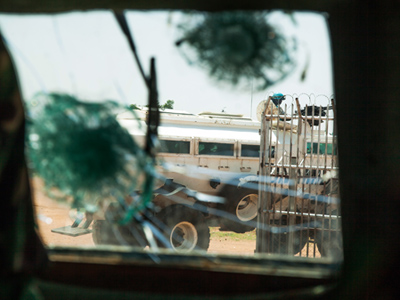News analysis: Sudan
Darfur violence further restricts access for humanitarians, peacekeepers

An armored personnel carrier of the UNAMID damaged in an ambush that killed seven Tanzanian peacekeeprs and injured 17 others on July 13 in Khor Abeche, South Darfur. Continuous attack on the mission does not bode well for humanitarians, who are also kept safe by the blue helmets in a midst of insecurity. Photo by: Albert González Farran / United Nations
The recent killing of U.N. peacekeepers and aid workers in Darfur brought not only heightened insecurity, but also inaccessibility fears among humanitarians struggling to keep up with operating challenges in the conflict-torn region in Sudan.
Just as access to the country’s other border states — such as Blue Nile — had started to improve, Darfur again takes center stage. Just this July, heavy fighting cost the lives of two aid workers, and international humanitarian organizations like World Vision are now considering moving their offices to a safer location in Nyala, the capital of South Darfur and where many other aid groups are based.
And not only aid workers have been caught in the violence. The United Nations Mission in Darfur, whose mandate includes providing armed escort to humanitarians across the region, lost seven of its peacekeepers — all from Tanzania — in an ambush on July 13, in the worst attack on the force since its deployment in 2007.
The attack sparked fear among the aid community in Darfur. Several humanitarians have told Devex this could hamper the UNAMID’s capacity to assist them in reaching particular areas in need of assistance in the region, where humanitarians are not allowed to enter without armed escort.
UNAMID’s ‘bigger problem’
UNAMID spokesman Christopher Cymanick admitted the troops are currently limited, but dispelled the grave concerns expressed by humanitarians.
“We have trucks, troops and personnel. The bigger problem is gaining access to areas. That’s been a bigger problem … not really in resources,” he told Devex.
Indeed, unfettered access to all areas — government-controlled or otherwise — remains a huge problem for the peacekeeping party, which is now looking into an extended mission following the expiration of its current mandate on July 31. Like humanitarians, they too are being hampered by tribal clashes in the north, or increasing violence in South Darfur.
The recent ambush against the peacekeepers however enables them to make an excellent case for getting better equipment from countries contributing troops to the mission.
Cyanmick explained that the UNAMID patrol that was attacked had only a couple of armored vehicles, and the others are not well protected. The spokesman argued they would not have sustained such losses if they had better equipment. Some countries do provide “adequate equipment,” but others do not, he added.
Speeding up the process for new soldiers to get their visas approved by local authorities would also help the mission work more effectively. It would help UNAMID “do rotations,” with patrols on duty 24 hours a day, seven days a week.
Those same bureaucratic delays have been affecting humanitarians, and Devex has learned that getting foreign aid workers in Sudan has become more difficult nowadays. This is concerning but not surprising, given that the Sudanese government has traditionally been wary of foreign aid groups operating in the country, and has been introducing measures to pressure groups to hand over programs to local partners that may be more vulnerable to government manipulation.
An observer previously told Devex: “It’s not a very conducive environment for carrying out humanitarian assistance. The NGOs feel that they are not getting enough support to be able to do their job. They are required to submit travel permits, and then they are very closely monitored by the authorities.”
‘Unhappy’ forces
It remains unclear who was behind the attack against UNAMID. But continuous attacks on the mission have very negative consequences for humanitarians, who also receive protection from the blue helmets.
Cynamick contemplates some groups may be unhappy with the force’s impartiality.
“We walk a very fine line. We work with both government and armed movements. We are not party to the conflict, and just trying to keep the peace. But what’s very sad about the latest incident was that [our personnel] are out doing patrol to protect Darfuris and at the same time being attacked by Darfuris,” he said.
The attacks illustrate the still very unstable environment in Darfur.
An aid official who spoke on condition of anonymity shared with Devex the importance of shifting toward development in the region, which many donors albeit mostly nontraditional ones supported in April. But continued fighting, the source admitted, is complicating such efforts.